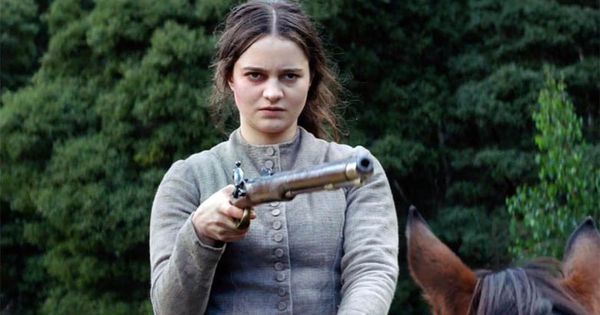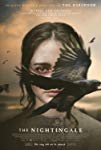Eye For Film >> Movies >> The Nightingale (2018) Film Review
The Nightingale
Reviewed by: Owen Van Spall

Writer/director Jennifer Kent follows up her acclaimed 2014 horror flick The Babadook with another story of a female going through an intense psychological and physical experience. It has been a long wait for a follow-up. But, unlike her debut, ambitious period thriller The Nightingale plays things more straight-down-the-line with its narrative, setting up the heroine’s motivations clearly and early on and following things through chronologically to their bitter end. Not much is left open to interpretation and there are few surprises in how things turn out. What does leave an impression is the acting, the use of locations, and the intensity of the experience; this is a bloody, angry and sad film about oppression and the consequences of it.
Young star Aisling Franciosi impresses in a fierce performance as Claire; a female Irish convict eking out a miserable existence in a military post as a servant in colonial-era Tasmania circa 1820s, serving under the watchful - and abusive - eye of British Lieutenant Hawkins (a suitably sneery, but ultimately one-note Sam Claflin). Hawkins is charged with overseeing Claire’s servitude, a service which is necessary for her to get her ‘ticket’ back home.

This is the area of Tasmania once known as ‘Van Dieman’s Land’, which we will see is an unstable mix of imported rulers, struggling and displaced Aboriginal people, and large uncharted forest areas where no law seems to run. This island saw much of its population wiped out as a result of settling by colonials.
As for Claire, she is not just a woman in a time of extreme patriarchy, she is Irish at a time when Britain still rules that country. A criminal female immigrant viewed as triply sub-human and now dumped in a foreign land that is itself being horrifically upended; not a great place to be. ‘Tickets’ are the threat held over the convict population’s heads by the British. The Nightingale is very much about where you sit - or were dumped - in the ladder of life.
In case you were in any doubt about what being at the bottom of the oppression pile means: Kent sets things up with brutal efficiency in the first 15 minutes. It is quite obvious from the minute we see Claire on screen, singing with a voice of crystalline beauty (about the only thing in this film that is elevated to a level of elegance) in front of a boozy and leery crowd of soldiers that the Lieutenant seems barely able to control, how she is going to lose everything she holds dear.
Raped by Hawkins after the performance in what is presumably one in a long line of attacks, Claire’s attempt to keep her earnest but hapless husband Aidan (who is also at risk of losing his ‘ticket’ home if he attempts to help) from intervening fails on this occasion, and an altercation inspires the vengeful Lieutenant to attack Claire in her home, leaving her husband and baby dead. The attack, playing out in real time with few merciful cutaways, is hard to watch. But I also got a feeling that Kent was getting to this point as quickly as possible so as to get the revenge part of the narrative rolling. Events play out as you’d expect and the stakes are clearly set, and the antagonists seem broadly-drawn so we want them dead as soon as possible (beyond the misogynistic and entitled Lieutenant, Claire’s rapists include an aggressive working-class Sergeant contrasted with a softer, guilt-ridden Ensign who cries during the attack and is clearly being pressured).
After the attack, Claire becomes a fierce, single-minded figure driven to track down and seek revenge against the British officer and his trio, who set off north to a new military post; a journey of several days through barely-mapped deep forest terrain. With all her fellow Irish unwilling to risk their own tickets and not thinking a woman could carry out this task of track-and-kill, and not likely to survive on her own without a guide, Claire has to buy the service of an Aboriginal tracker named Billy (Aboriginal actor Baykali Ganambarr) to help her hunt Hawkins down. This where the Nightingale hits its peak. Having already taken control of a rape-revenge story, a kind of niche film historically directed and written by men, Kent now toys around with other types of movie; in particular the ‘Australian outback’ and ‘cross-racial buddy’ sub-genres, switching up the traditional sexes and motivations and keeping colonialism and class in the foreground.
Claire is an Irish immigrant forcibly transported to this foreign land, but is white and as racist about the Aboriginal people as her abusers were. She calls Billy ‘boy’ (a derogatory term heard again and again) and firmly believes that only the promise of half the money following the success of their mission is keeping the Aboriginal’s loyalty. She keeps a musket trained on Billy for the first day of their journey, believing herself at risk of rape, robbery, or worse. Billy understandably, due to the trauma from his own violence-filled past at the hands of the white man, sees Claire as no different and is not minded to think a woman can survive out in the wild. He doesn’t care that this woman keeps affirming she is ‘Irish, not English’.
The dynamic between Billy and Claire is interesting and convincingly acted out by the two leads, imbuing their characters with what we would today call PTSD. They are both victims, and come to recognise this in each other, even though their experiences have been different and they are oppressed on different criterion. One has been taken from her land, the other has seen his land invaded. They both get to share their different backgrounds over campfires and brief respites; where they learn both have been taken away from their families and seen their loves ones killed.
But even if all the dialogue was removed Kent’s film would still effectively show us how marginalised this pair is, as time after time we witness how being an Aboriginal and being a woman in 1820s Tasmania means that, even excluding the harsh forest environment, everything is out to kill you. There are literally horrors around every corner driven by misogyny, rape culture and racism. Their journey is repeatedly interrupted by rifle fire as groups of hunters and trackers assume Billy is fair game, and setting up camp at night means Claire being constantly at risk of rapists lurching out of the shadows. At times, as their relationship shifts to one of trust, Claire has to assume the role of captor to fool groups of male marauders passing by who might be tempted to either take Billy prisoner or execute him on the spot for kicks or imagined crimes. There seems to be no authority anywhere. This grim passage through suitably dank and menacing forest terrain is only briefly interrupted by flashes of profanity-laden humour from Billy, who keeps a sense of mischief despite all that has happened and enjoys expressing his disbelief as Claire’s ignorance of survival techniques.
Kent doesn’t quite stick the landing with this unsentimental film, darting the story away from Claire and Billy for more and more scenes of violence dished out by Hawkins when we already have seen the colour of his soul, and a sense of repetitiveness starts to creep in as Clair repeatedly runs into Hawkins without resolution and the film approaches the two-and-a-half hour mark. But Franciosi and Ganambarr’s performances, and the razor-sharp, haunting brutality of this bygone world conjured up by Kent, with grit under the fingernails of all the characters and a tangible sense of mud and blood clinging to every surface (“Full of misery from top to bottom.” Claire calls it), should keep most viewers on board.
Reviewed on: 01 Jun 2019

















